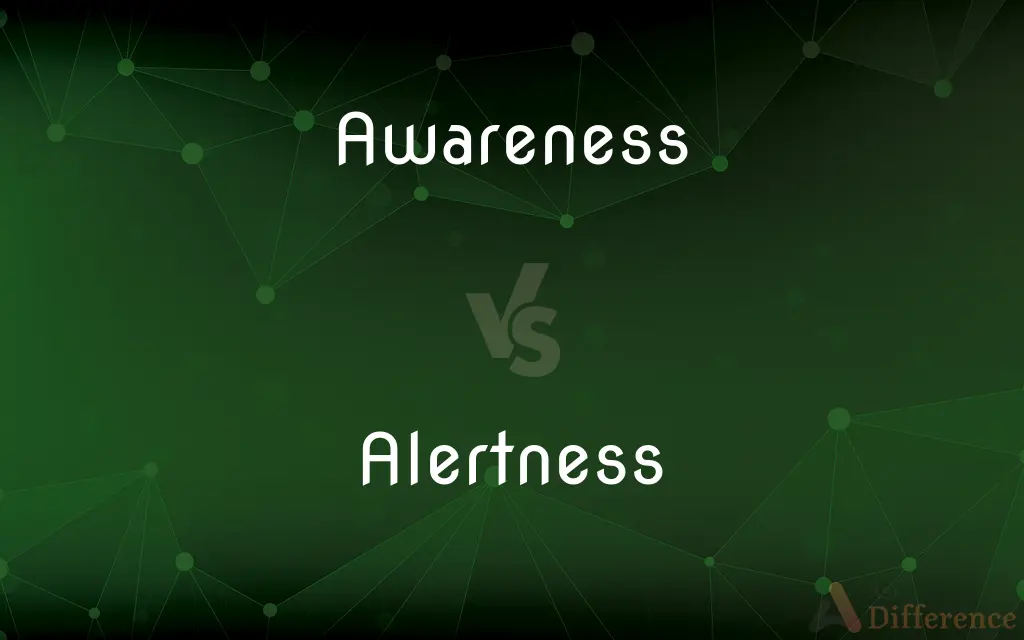Awareness vs. Alertness — What's the Difference?
By Urooj Arif & Fiza Rafique — Updated on March 25, 2024
Awareness is the knowledge or perception of a situation, whereas alertness is the state of being attentive and prepared to respond.

Difference Between Awareness and Alertness
Table of Contents
ADVERTISEMENT
Key Differences
Awareness involves an understanding or consciousness about something, such as being aware of social issues or understanding one's own emotions. It implies a broad or general knowledge that something exists or is happening. On the other hand, alertness is more about the readiness and quickness in noticing and responding to changes in the environment. While awareness can be passive, alertness is an active state of being focused and responsive.
In terms of cognitive processes, awareness is the recognition of specific information, feelings, or external stimuli, which can be either conscious or subconscious. It's possible to be aware of something without actively focusing on it. Alertness, however, implies a heightened sense of focus and concentration, often required in situations that demand immediate attention or reaction, like driving a car or monitoring a critical process at work.
From a practical standpoint, being aware does not necessarily require one to be in a state of readiness to act. For example, one may be aware of the potential for natural disasters in their area without being constantly alert to them. Alertness suggests a more immediate engagement with one’s surroundings, being watchful for any signs of change or potential threats.
The development of awareness and alertness also involves different psychological and physical mechanisms. Awareness can develop through education, experiences, or reflection, broadening one’s understanding of complex issues or internal states. Alertness, however, is often a result of physiological arousal, preparing the body and mind to act quickly in response to potential danger or to carry out tasks requiring acute attention.
Despite their differences, awareness and alertness can complement each other in various aspects of life and work. High levels of awareness can enhance one’s capacity for alertness, as a deeper understanding of one’s environment can inform quicker and more effective responses. Conversely, being alert can lead to increased awareness by drawing one’s attention to new or overlooked details in their surroundings.
ADVERTISEMENT
Comparison Chart
Definition
Knowledge or perception of a situation or fact
The state of being attentive and prepared to respond
Focus
Broad understanding or consciousness
Immediate readiness and quickness to notice and respond
Cognitive Aspect
Can be passive or subconscious
Active, requiring focus and concentration
Development
Through education, experience, reflection
Physiological arousal, readiness to act
Practical Application
Understanding complex issues, self-awareness
Immediate engagement, readiness for action
Compare with Definitions
Awareness
Acknowledgment of personal emotions or states.
Mindfulness practices enhance emotional awareness.
Alertness
Readiness or vigilance towards the surroundings.
The guard’s alertness ensures the safety of the premises.
Awareness
Consciousness or recognition of one’s environment, feelings, or social issues.
Increased environmental awareness has led to more sustainable living practices.
Alertness
The quality of being quick to notice and react to potential danger or opportunities.
His alertness to market changes has made his business successful.
Awareness
Understanding gained through education or experience.
Her awareness of historical injustices informs her activism.
Alertness
A heightened state of attention and concentration.
Night driving requires a high level of alertness.
Awareness
Perception of subtle cues or details within a context.
An artist’s awareness of color nuances greatly affects their work.
Alertness
Preparedness to act in a timely manner.
Emergency services personnel are trained for maximum alertness in crisis situations.
Awareness
The state of being informed about a particular topic or issue.
Public health campaigns aim to raise awareness about the importance of vaccination.
Alertness
The ability to respond swiftly to stimuli or changes.
The athlete’s alertness to the starting signal gave her an edge in the race.
Awareness
Awareness is the state of being conscious of something. More specifically, it is the ability to directly know and perceive, to feel, or to be cognizant of events.
Alertness
Alertness is the state of active attention by high sensory awareness such as being watchful and prompt to meet danger or emergency, or being quick to perceive and act. It is related to psychology as well as to physiology.
Awareness
Having knowledge or discernment of something
Was aware of the difference between the two versions.
Became aware that the music had stopped.
Alertness
The quality of being alert
Walsall were indebted to the bravery and alertness of their goalkeeper
A lack of mental alertness
Awareness
Attentive and well informed
"Most scientists are thoughtful, liberal-minded and socially aware people" (Armand Marie Leroi).
Alertness
Vigilantly attentive; watchful
Alert to danger.
An alert bank guard.
Awareness
(Archaic) Vigilant; watchful.
Alertness
Mentally responsive and perceptive; quick.
Awareness
The state or level of consciousness where sense data can be confirmed by an observer.
I gradually passed from sleep to full awareness.
Alertness
Brisk or lively in action
The bird's alert hopping from branch to branch.
Awareness
The state or quality of being aware of something.
The awareness of one type of idea naturally fosters an awareness of another idea
Raise awareness of a topic
Alertness
A signal that warns of attack or danger
Sirens sounded the alert for an air raid.
Awareness
Conscious knowledge; as, he had no awareness of his mistakes.
Alertness
A condition or period of heightened watchfulness or preparation for action
Nuclear-armed bombers were put on alert during the crisis.
Awareness
A state of elementary or undifferentiated consciousness; as, the crash intruded on his awareness.
Alertness
To notify of approaching danger or action; warn
A flashing red light that alerted motorists to trouble ahead.
Awareness
Having knowledge of;
He had no awareness of his mistakes
His sudden consciousness of the problem he faced
Their intelligence and general knowingness was impressive
Alertness
The quality of being alert or on the alert
Awareness
State of elementary or undifferentiated consciousness;
The crash intruded on his awareness
Alertness
The quality of being alert or on the alert; briskness; nimbleness; activity.
Alertness
The process of paying close and continuous attention
Alertness
A state of readiness to respond;
Alerting was indicated by the desynchronization of the EEG
Alertness
Lively attentiveness
Common Curiosities
How does alertness affect performance?
High alertness can significantly improve performance, especially in tasks that require quick reaction times and focused attention.
Can alertness be trained or improved?
Yes, alertness can be improved through practices like mindfulness, adequate sleep, and physical exercises that enhance cognitive function and reaction times.
Is alertness the same as vigilance?
Alertness and vigilance are closely related, with both involving readiness and attention, though vigilance especially emphasizes long-term attention and watchfulness.
How does culture influence awareness?
Cultural background can shape awareness by determining which information and stimuli are emphasized or overlooked within a community.
Why is awareness important?
Awareness is crucial for understanding complex issues, making informed decisions, and enhancing one’s perception of personal and external environments.
How do awareness and alertness relate to safety?
Both awareness and alertness are key to safety, with awareness providing the knowledge of potential dangers and alertness enabling quick responses to avoid or mitigate risks.
Are there tools or techniques to increase awareness?
Techniques such as meditation, education, and reflective practices can increase awareness by expanding understanding and perception.
How do stress and anxiety impact awareness and alertness?
While moderate stress can enhance alertness, excessive stress or anxiety can overwhelm cognitive resources, impairing both awareness and alertness.
What is the difference between awareness and alertness?
Awareness refers to the knowledge or perception of situations or facts, while alertness is the state of being attentive and ready to respond to changes or threats.
Can someone be aware but not alert?
Yes, one can have awareness (knowledge or perception) without being in a state of alertness (readiness to act).
How do sleep and rest affect alertness?
Adequate sleep and rest are essential for maintaining high levels of alertness, as they allow the brain and body to recover and function optimally.
Is there a genetic component to awareness and alertness?
Genetics may influence baseline levels of awareness and alertness, but environmental factors and training also play significant roles.
Can technology aid in enhancing alertness?
Yes, technology such as alertness monitoring devices and apps can help individuals manage and improve their state of alertness.
How do awareness and alertness interact in learning environments?
In learning environments, awareness of the material facilitates comprehension and retention, while alertness ensures engagement and responsiveness to the learning process.
Can awareness and alertness decline with age?
Although certain cognitive functions may decline with age, practices such as lifelong learning and physical activity can maintain or even improve awareness and alertness.
Share Your Discovery

Previous Comparison
Immigration vs. Emigration
Next Comparison
Plaid vs. FlannelAuthor Spotlight
Written by
Urooj ArifUrooj is a skilled content writer at Ask Difference, known for her exceptional ability to simplify complex topics into engaging and informative content. With a passion for research and a flair for clear, concise writing, she consistently delivers articles that resonate with our diverse audience.
Co-written by
Fiza RafiqueFiza Rafique is a skilled content writer at AskDifference.com, where she meticulously refines and enhances written pieces. Drawing from her vast editorial expertise, Fiza ensures clarity, accuracy, and precision in every article. Passionate about language, she continually seeks to elevate the quality of content for readers worldwide.
















































